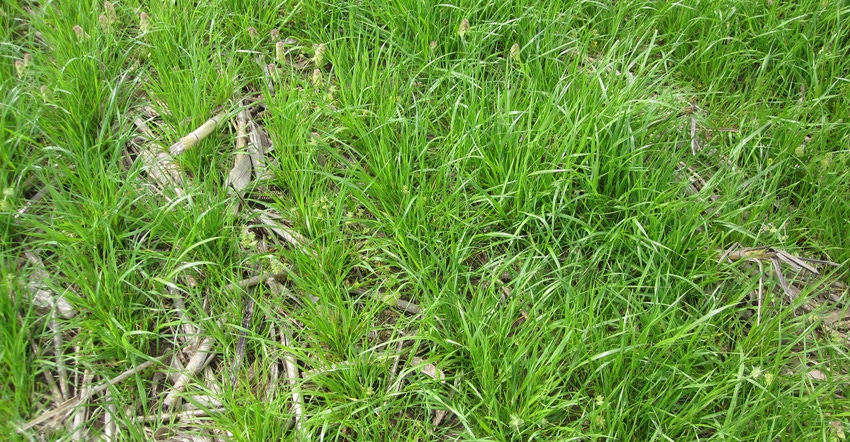March 18, 2021

While annual ryegrass has been used for many years as a cover crop in Indiana, many farmers are hesitant to include it in their cover crops of choice. Some of this hesitancy is based on potential issues with termination of annual ryegrass, and the resulting problems that might arise due to poor termination results. Another concern is the potential for it to escape and become a weed. This brief discussion will go a long way toward putting these concerns to rest.
Keep in mind the differences between annual ryegrass and cereal rye. Ryegrass is an annual forage with the ability to put down deep roots over winter. Cereal rye is a cereal grain with totally different characteristics. Don’t call either one “annual rye,” since that can lead to confusion.
The roots that ryegrass puts down all winter provide the ability to break up soil compaction. Those roots are also why ryegrass can be a challenge to terminate if you do not use the “recipe.��” It is recommended to get comfortable with the use of cover crops before using ryegrass on a large scale.
The late Mike Plumer, longtime researcher with University of Illinois Extension, probably completed more research and on-farm trials with it than anyone else. He was a major contributor to “Annual Ryegrass as a Cover Crop,” which provides the backbone of the following considerations.
Tips for ryegrass cover
Follow these tips for using ryegrass:
Termination begins with seed selection. Annual ryegrass is one cover crop where variety matters. Be very cautious about using seed that is “Variety Not Stated.” You want a variety that will not winter kill in your area but will mature equitably in the spring to ensure an effective termination. Italian ryegrass is not annual ryegrass. Don’t use Italian ryegrass as a cover crop.
Timing is key. In the spring, annual ryegrass needs to break dormancy and be actively growing before you terminate. If you have not mown your lawn twice, it’s too early to terminate ryegrass. Generally, at least three consecutive days of temperatures 50 degrees F or higher, with no night temperatures below 35 degrees, are warm enough. Do not try to terminate ryegrass on the first warm, sunny day of spring.
Time of day matters. Since ryegrass shuts down translocation at night, it takes herbicide three hours or so to translocate to the root. Herbicide application needs take place from 10 a.m. until 2 p.m. Pay attention to termination details!
Spray water matters. Another key is your spray water. Two key attributes are acidity and hardness. Both can impact the effectiveness of many herbicides. You will probably need to add an acid product to reduce the pH of the water, along with checking on hardness or calcium level. Contact your local ag retailer for products to treat your spray water if you do your own ryegrass termination and/or weed control. Also, it is vital that you add the amendments and do proper agitation of the water prior to adding any herbicides. Check labels to make sure that mixing multiple herbicides will not produce an antagonistic effect.
Use annual ryegrass when it fits. Ryegrass can be a valuable tool on your soil health journey when used correctly. If you feel that ryegrass fits your operation and would like to learn more, contact your local Natural Resources Conservation Service, or soil and water conservation district programs.
Donovan is a district conservationist with the Natural Resources Conservation Service. He writes on behalf of the Indiana Conservation Partnership.
About the Author(s)
You May Also Like






